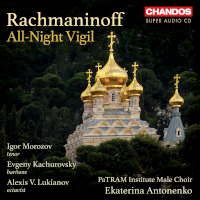Review by Colin Clarke
RACHMANINOFF
All-Night Vigil,
op. 37 (arr. Gretchaninoff/Lazarev/Sheehan)
•
Ekaterina Antonenko, cond; Igor Morozov (ten); Evgeny Kachurovsky
(bar); Alexis V. Lukianov (bs); PaTRAM Institute Male Ch
•
CHANDOS 5349 (SACD: 70:13  )
)
This is a valuable addition to the “Rachmaninoff 150” celebrations. The PaTRAM Institute Choir is remarkable, as I found out when I reviewed its Chandos release More Honorable than the Cherubim (Fanfare 45:3). The choir’s broad repertoire is exemplified in that previous disc; here, it is but one composer, Rachmaninoff. But this is arguably Rachmaninoff’s most profound work, worlds away from the eminently human, heart-based melodies of works such as the Second Piano Concerto. Here, we are at the center of Christian religious orthodoxy. Composed in 1915, and therefore in the midst of war, the piece offers Divine consolation.
The Russian Orthodox service of the Vigil combines the offices of Vespers and Matins. Rachmaninoff takes chant melodies and interiorizes them; the result is glowingly beautiful. So is PaTRAM’s response: Try, for example, the repeated “Alleluias” of the third movement, “Blessed is the man.” The rich sound of this all-male arrangement, which includes parts for contra-tenors, is partly due to the use of oktavists (extra-deep basses). The arrangements of the movements are divided between Benedict Sheehan and Dmitri Lazarev, except for one (“Glory to God”) which is by Gretchaninov; it was this last that provided the impetus for this magnificent disc. With the general deepening of timbre for an all-male rendition, the basso profondo element takes on added significance; for “Bless the Lord” the superb baritone Evgeny Kachurovsky takes the solo instead of the original tenor.
Conductor Ekaterina Antonenko paces the pieces superbly; it moves (this is not the longest recording, for sure), but the pervasive sense of mysticism is retained throughout. The “lift” of the 15th and final movement (To Thee, the victorious Leader of triumphant hosts) is truly inspirational. The control of the choir itself is sometimes beyond belief: the extraordinary diminuendo into silence at the end of the Kievan chant of the Nunc dimittis (Lord now let thy servant depart in peace) is a prime example, the entire movement being one of the high points of the disc. Later, the Magnificat surely provides some of the most astonishing harmonies that Rachmaninoff ever penned. It is utterly remarkable, and PaTRAM’s performance pierces the soul. The Gretchaninov arrangement (Glory to God in the highest) is beautifully hushed.
Tenor Igor Morozov has the most wonderful voice, burnished and yet somehow vulnerable, one of the most beautiful voices per se I have ever heard. Likewise, it is difficult not to be impressed by the octavist Alexis V. Lukianov. The deacon’s incantation “Arise! Master, give the blessing!”, the very first sounds we hear, reveal a chthonic voice, one of great beauty and totally under control. Baritone Evgeny Kachurovsky’s voice radiates focus in the second movement (Bless the Lord, O my soul); his timbre perfectly suited to this repertoire.
The Chandos recording is perfect. The reverberation is ideal, and so is the sound image. The recording venue was the Church of the Ascension (the Orthodox Russian Monastery Church of the Ascension, Mount of Olives, Jerusalem, to be precise). Could there be a more perfect setting?
Sometimes a disc arrives that unites so many aspects into one great recording. This is one of those: the recording itself, which supports the choir’s sound and so perfectly replicates the choir’s depth; the venue; and the performance. All three soloists are magnificent. This is a piece that tends to inspire choirs to peak performances: try the Estonian Philharmonic Chamber Choir, the Robert Shaw Festival Singers, not to mention a host of Russian choirs. It is Ekaterina Antonenko’s performance, though, that now takes pride of place on my shelf. This is a prime Want List candidate. Colin Clarke






















